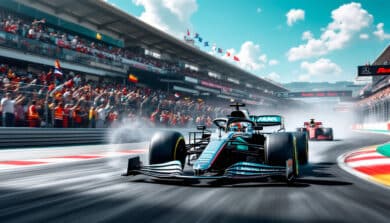Lewis Hamilton’s final lap with Mercedes at the 2024 Abu Dhabi Grand Prix marked the end of an era in Formula 1. Despite a challenging season, Hamilton’s farewell race was a poignant mix of high emotions, strategic maneuvers, and a testament to his enduring legacy with the team. This article delves into the circumstances of Hamilton being lapped, his illustrious career, Mercedes’ role in his success, and the broader implications for the F1 landscape.
The Final Abu Dhabi Grand Prix: A Race of Mixed Emotions
The 2024 Abu Dhabi Grand Prix at the Yas Marina Circuit was set to be a historic event, witnessing Lewis Hamilton’s swan song with Mercedes. Held on December 8, 2024, the race unfolded under the bright lights of the night circuit, creating a dramatic backdrop for what would become a memorable farewell. The conditions were optimal, with clear skies and a mild temperature that provided a perfect setting for high-speed racing.
From the outset, the race presented numerous challenges. A critical error during qualifying saw Hamilton start 16th on the grid, a position far below his usual standing. This setback was primarily due to a miscalculation by the Mercedes team, which left Hamilton grappling with a difficult race ahead. Team principal Toto Wolff publicly apologized for the “idiotic” mistake, acknowledging the severe impact it had on Hamilton’s chances.
As the race progressed, Hamilton demonstrated his resilience and strategic acumen. Despite the poor starting position, he navigated through the field, capitalizing on incidents ahead and making tactical overtakes. The decision to employ an alternate tire strategy was pivotal, allowing him to run deeper on the hard tires before pitting and setting the stage for a strong finish.
The climax of the race came in the final laps, where Hamilton executed a daring overtake on his teammate George Russell. This move was not just a display of his driving prowess but also a symbolic gesture, underscoring the intense intra-team competition that had characterized their partnership over the years.
- Starting Position: 16th on the grid due to qualifying errors.
- Tire Strategy: Alternate strategy with hard tires for a late surge.
- Key Overtake: Final lap pass on teammate George Russell.
- Race Finish: Hamilton secured 5th place, marking his last finish with Mercedes.

Lewis Hamilton: A Legendary Career with Mercedes
Lewis Hamilton’s partnership with Mercedes is one of the most successful in the history of Formula 1. Over 12 seasons, Hamilton clinched six world drivers’ championships with the team, solidifying his reputation as one of the greatest drivers of all time. His tenure with Mercedes began in 2013, and together they revolutionized the sport with their dominant performance and innovative strategies.
Hamilton’s impact on Mercedes cannot be overstated. Under his leadership and driving skills, the team secured eight constructors’ titles between 2014 and 2021. His ability to extract maximum performance from the car, coupled with his strategic thinking, made Mercedes a formidable force on the track. Moreover, Hamilton’s influence extended beyond racing; he was a pivotal figure in promoting diversity and sustainability within the sport.
Throughout his career, Hamilton achieved numerous milestones:
- 84 Race Wins: The most by any driver in F1 history.
- 78 Pole Positions: Demonstrating his unmatched qualifying speed.
- 153 Podium Finishes: Consistently competing at the highest level.
- 6 World Championships: All secured with Mercedes.
Hamilton’s decision to depart Mercedes in 2024 was met with mixed emotions. While his final season was fraught with challenges, his legacy with the team remains untarnished. The emotional farewell at Abu Dhabi, highlighted by his final overtake and the team’s tributes, underscored the deep bond and mutual respect between Hamilton and Mercedes.
Mercedes: Navigating Challenges and Shaping the Future
Mercedes has been a dominant force in Formula 1, particularly during the hybrid era which began in 2014. The team’s engineering excellence, strategic prowess, and ability to attract top talent have been key to their sustained success. However, the 2024 season presented significant hurdles, testing the resilience and adaptability of the team.
Several factors contributed to Mercedes’ struggles in 2024:
- Technical Issues: The W15 car faced performance inconsistencies that hampered competitiveness.
- Strategic Missteps: The qualifying error that placed Hamilton 16th was a critical oversight.
- Intra-team Rivalry: The dynamic between Hamilton and Russell added pressure, affecting overall team harmony.
- External Competition: Rivals like Red Bull and Ferrari made significant strides, narrowing the performance gap.
Despite these challenges, Mercedes remains a key player in the championship. The team’s ability to adapt and innovate will be crucial as they look to rebuild and maintain their status at the pinnacle of motorsport.
Looking ahead, Mercedes faces several strategic decisions:
- Driver Line-up: With Hamilton’s departure, finding the right replacement is imperative.
- Technical Development: Enhancing the car’s performance to compete with evolving regulations.
- Team Dynamics: Fostering a harmonious environment to maximize driver and team performance.
- Sustainability Initiatives: Continuing their push towards greener technologies in racing.
The departure of a driver like Hamilton opens new avenues for Mercedes to explore. It provides an opportunity to integrate fresh talent and perspectives, potentially leading to a new era of success.

Reactions and Future Implications
The lapping of Lewis Hamilton by his own Mercedes team during the 2024 Abu Dhabi Grand Prix sparked a wave of reactions across the Formula 1 community. Fans, analysts, and fellow drivers weighed in on the significance of the moment, reflecting on Hamilton’s illustrious career and the future of Mercedes.
Lewis Hamilton expressed his gratitude and emotions post-race, highlighting the honor of racing for Mercedes:
“It’s been the greatest honor of my life,” Hamilton stated, acknowledging the team’s support and the remarkable journey they shared. His heartfelt thanks extended to his team, engineers, and everyone who contributed to his success.
Team principal Toto Wolff commended Hamilton’s performance despite the setbacks:
“He drove like a world champion today from P16. We played the long game and finished fourth, driving away from the Red Bull. That was a statement of a world champion,” Wolff remarked, emphasizing the strategic brilliance and resilience displayed by Hamilton.
Media coverage of the event focused on the emotional and symbolic aspects of Hamilton’s final race with Mercedes. The tributes, including the emotional video shared by Mercedes on social media, captured the essence of Hamilton’s impact on the team and the sport.
Fans around the world celebrated Hamilton’s legacy while also expressing excitement about his future endeavors with Ferrari. The move was seen as a significant shift in the F1 landscape, potentially reigniting rivalries and sparking new storylines for the upcoming seasons.
The implications of this event extend beyond the race itself. For Mercedes, it marks the end of a golden era and the beginning of a rebuilding phase. For Hamilton, it opens a new chapter with Ferrari, a team with its own rich history and passionate fan base.
- Legacy: Hamilton’s achievements with Mercedes set a high benchmark for future drivers.
- Team Strategy: Mercedes must reassess their strategies to regain their competitive edge.
- Future Rivalries: Hamilton’s move to Ferrari is likely to intensify existing rivalries.
- Fan Engagement: Continued support from fans will be crucial for both Hamilton and Mercedes.
As the F1 community looks forward to the 2025 season, the events of the Abu Dhabi Grand Prix will be remembered as a pivotal moment in the sport’s history. The blend of triumphs, challenges, and heartfelt goodbyes encapsulates the dynamic and ever-evolving nature of Formula 1.


